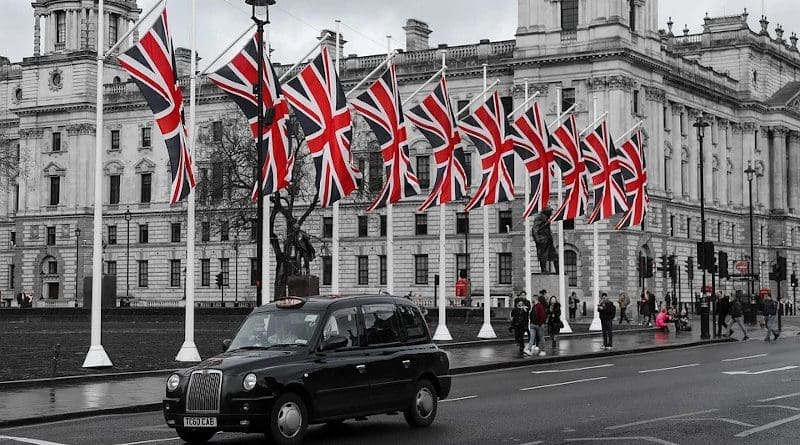Boosting Post-Brexit Global Appeal Is Key UK Goal – OpEd
By Arab News
By Andrew Hammond
One of the central claims of many Brexiteers has long been that leaving the EU would significantly enhance the UK’s global economic attractiveness. However, a major UK government review recently concluded that there is a £50 billion ($63 billion) a year — and growing — investment gap between the country and other advanced nations.
The eye-catching £50 billion figure comes from the fact that many of the UK’s competitor economies generate about 12 percent of gross domestic product through business investment (both domestic and foreign), whereas the figure for London is about 10 percent. So, the potential prize is a big one, as Lord Harrington, who led the government review, rightly highlights.
The stark fact is that foreign direct investment into the UK fell in value every year from the Brexit referendum in 2016 to at least 2021. This saw the country drop down the Organisation for Economic Co-operation and Development rankings for FDI flows from 12th place in 2015 to 20th in 2022.
Accounting firm EY asserts that the total number of FDI projects in the UK fell to 929 in 2022, putting it second in Europe behind France, which had 1,259. Britain also slipped to third in Europe for perceived attractiveness for FDI, behind Germany and France.
To try to turn this troubling picture around, Harrington’s review concluded that the UK government must radically reform its offer to foreign investors with the goal of making the nation the most attractive destination in Europe for internationally mobile investment. This includes by emulating the subsidy-led, strategic state-backed approach of larger economies like the US, the EU and China.
Harrington — who is on the moderate wing of the ruling Conservative Party and was a “Remainer” in the 2016 Brexit referendum — wrote in his report: “I have formed the view during this process that capitalism has changed. The reality is that many of our competitors chase investments via their industrial strategies backed by substantial government support.” One example is America’s 2022 Inflation Reduction Act.
In the report, Harrington proposed what is, in effect, the need for a clear new UK business investment strategy. He suggested focusing on five sectors as economic growth engines: green industries, digital, life sciences, creative industries and advanced manufacturing.
As a Conservative politician, Harrington was keen to stress that this would not see the UK government seeking to pick individual corporate winners, which would be anathema to many of the economic liberals in his party. However, he did advocate the need to “pick the race” (green technology, for example) in which the UK wants to entrench a global competitive advantage.
Harrington also qualified his conclusions by stating that the UK cannot and should not try to outcompete bigger economies like the US with mega-subsidies like the Inflation Reduction Act. However, he nonetheless advocated that the UK’s current offer must be significantly enhanced and that “a complete culture change” is needed in the nation’s approach to attracting FDI.
Harrington engaged with more than 200 firms, financial institutions and sovereign wealth funds and his conclusions have been welcomed by many business leaders, including industry groups like manufacturers’ trade group Make UK and the British Chambers of Commerce. However, the review represents a key political challenge for Prime Minister Rishi Sunak. This is because he has repeatedly rejected calls for such a UK industrial strategy — as indeed did former Conservative prime ministers Liz Truss, Boris Johnson and David Cameron. The sole exception since 2010 was Theresa May when she headed the government from 2016 to 2019.
While the interventionist thrust of Harrington’s recommendations will not be shared by every UK politician, there is a broad consensus that the nation needs to improve its FDI record. This includes attracting emerging market-rich geographies like the Middle East and Asia-Pacific.
Take the example of the Gulf Cooperation Council states — Bahrain, Kuwait, Oman, Qatar, Saudi Arabia and the UAE — which already enjoy a strong investment and trade relationship with the UK and are a key target for the London government for deeper economic relations. Outside of the EU, for instance, the GCC is one of the largest export markets for the UK, with total bilateral trade of about $40 billion in 2019.
There is also a significant opportunity in Asia-Pacific, given that at least 50 percent of global growth is forecast to take place there between now and 2035. Here, the UK is seeking to leverage its membership of the Comprehensive and Progressive Trans-Pacific Partnership, known as CPTPP, which also includes Australia, Brunei, Japan, Malaysia, New Zealand, Singapore and Vietnam.
While the CPTPP opportunity may be significant in the longer term, even the UK government’s own assessment declares that the economic gains for the country will be fairly small in the medium term, at only about 0.08 percent of GDP over 10 years.
However, optimists like UK Trade and Business Secretary Kemi Badenoch argue that CPTPP is akin to a startup and that those medium-term estimates do not account for the fact that some members — for example, Vietnam — are rapidly growing in importance in global trade. She also flags that a key perk of the new deal is greater access to all CPTPP markets, including a pledge to eliminate or reduce 95 percent of import charges or tariffs.
Now is the time for the UK to step up its global FDI game. This includes in the Middle East and Asia-Pacific, where the nation must now double down, economically, to try to take advantage of the investment and trade opportunities that post-Brexit deals could bring.
- Andrew Hammond is an Associate at LSE IDEAS at the London School of Economics.

